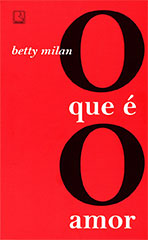
excerpt
I prefer to love above all else, I depend on it not to be who I am but who I want to be, to dream about another, to drift away, to navigate the high seas without rudder, forgetting the ground where I actually tread.
synopsis
In O que é o amor?, Betty Milan seeks to answer the question in the title. She focuses on the passion of love, analyzing this contradictory feeling that insensitively turns into hate. She examines in details the speech of love – from I love you to you drive me mad and even it’s your fault – and shows how disillusion can be born of illusion.
Finally, she contraposes the passion of love and the passion for play, which is love Brazilian style, the best example of which is found in Mario de Andrade’s novel Macunaíma.
history
It was published by Brasiliense in 1983, under the title O que é amor, and had various subsequent editions in the pocket format of the Coleção Primeiros Passos, with the definitive edition in 1999, when the book was revised and published by Record, now renamed O que é o amor? The chapter “Love Talk [“Dizeres”] was adapted for the theater in 1994, under the title Paixão. The play, interpreted by Nathalia Timberg in almost every state in Brazil, was also issued on audio (CD). The same “Dizeres” chapter led to an exhibitionof phrases, with art by the architect, designer and plastic artist Augusto Livio Malzoni, which circulated through public libraries in the state of São Paulo: in Aparecida (July 15 to 31, 1994), Lavrinhas (August 1 to 15, 1994), Paraibuna (August 16 to 31, 1994), Taubaté (September 1 to 15, 1994), Lorena (October 16 to 31, 1994), Cachoeira Paulista (November 1 to 15, 1994), Ubatuba (November 16 to 30, 1994), Caraguatatuba (November 1 to 15, 1994), São Sebastião (December 16 to 31, 1994), Jacareí (January 1 to 15, 1995).
opinion
BRASIL
“To love, is above all else, to experience the impossibility of total union and, even after recognizing failure, to continue to love Love. There is no love without passion. And Betty Milan is interested in passion.”
Gérard Lebrun, Jornal da Tarde, July 2, 1983
“Betty Milan invents an amorous discourse … like Scheherazade, she tells stories.”
Neide Archanjo, dust jacket of the book, 1991
“To the author it is not a matter of proposing one or another objective definition of love but one of assuming, in her book, the very logic of amorous passion.”
Michel Lahud, Folha de S. Paulo, August 21, 1983
PORTUGAL
“I read O que é o amor? with intellectual pleasure and gain.”
Eduardo Prado Coelho, letter, January 15, 1984
areas of interest
Literature, Psychology, Psychoanalysis, Anthropology, because of the counterpoint between the love of love and the love of play.


